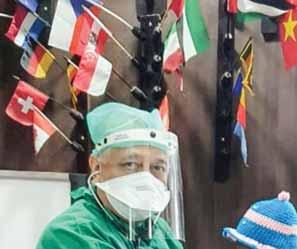
12 minute read
A Rotarian doctor recalls his brush with coronavirus

Ranjan Deshpande
Advertisement
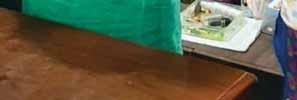
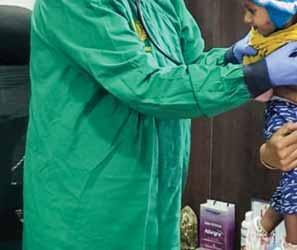
In the background of the shocking demise and loss of our beloved PRID Y P Das, and my batchmate, PDG V Nagaraj from RID 2981, both due to Covid-related complications, I am sharing my frightening brush with the dangerous coronavirus. And I urge you all to be very careful and protect yourselves and your families.
On April 6, on All India Radio, I spoke about corona and children, where I said this virus was going to stay with us for a long period. I lost a personal friend, a classmate right from MBBS, a simple man who continued his practice in a rented small building and became a victim, getting complications and dying despite the best of treatment.
In my wildest imagination, I never thought I will fall prey to coronavirus. Being a senior paediatrician, I followed all precautions of social distancing, wearing full PPE and regular hand hygiene for all. I was careful keeping kids’ parents away by two metres, and examining the children.
I was told by family members not to go to the hospital because of my age. But I did go, spending only four hours in the OPD, taking a lot of care.
On the evening of July 8, my wife complained of sore throat. Next morning, she was running temperature and had body ache. We got her tested immediately; she was positive. Two days later, I developed mild symptoms of headache and body ache. I too tested positive and we were admitted in our own hospital, a designated Covid hospital. In my 42-year career I had not taken a single day’s leave for any illness, and would tell my younger doctors and nurses that youngsters should never fall sick. “Look at me, I never take leave”, used to be my words.
Treatment was immediately initiated by my son Dr Kavan, who is a paediatric intensivist and my daughter-in-law Dr Pallavi, a clinical
microbiologist. They were closely monitoring our health and discussing the mode of treatment with Covid experts from Hubli and Bengaluru. It seemed as though both of us had a mild infection and we were recovering with all the normal clinical and laboratory parameters. As both of us were improving, we were to be discharged on Day 10.
The next morning my wife was very happy that we were going back home. But fate had different plans. That afternoon, I felt extremely tired and was unable to talk or walk. My oxygen saturation started dropping and I started getting breathless. Immediately my son took an appointment for an HRCT scan and ECG. At the scan centre, I was not able to walk even a few steps to the scan machine and breathing was getting difficult.
The CT scan of the chest and laboratory parameters showed changes warranting admission to a higher centre at Hubli for observation and further course of treatment. The same evening my wife and I were driven from our hospital; she was dropped home and I called my two grandchildren to the gate. Along with my daughter-in-law they waved goodbye from a distance. In my heart, I wondered if I was seeing them for the last time.
I was further investigated, put on various medication and continuous oxygen and was monitored meticulously. After three days my oxygen saturation further dropped and I wondered if I would be shifted to the ICU and prayed that I shouldn’t be put on a ventilator.
Some of the medicines used in Covid treatment were difficult to
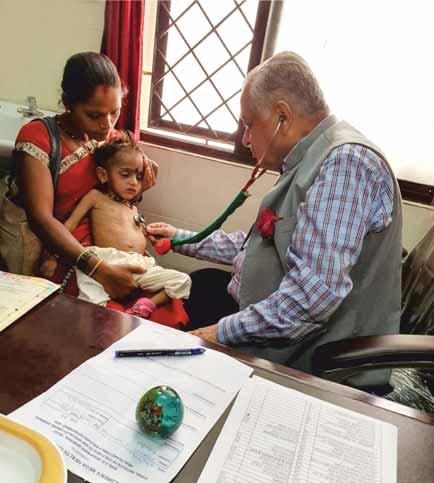
Take corona pandemic seriously
Guard yourselves and opt for virtual meetings and avoid unnecessary in person meetings.
Never ever forget to wear masks and also remind others talking to you to put on the mask, covering face and nose.
Avoid courtesy visits.
Remember the only person who can help you is yourself.
procure and not available easily. In anticipation of the worst, my son had procured injections, each costing `40,000. Oxygen was continued with increased quantum.
The entire team of physicians, pulmonologists and intensivists, along with Covid experts, discussed and decided to give me plasma therapy. Two Covid experts explained to me that this would not create complications and I would get better the very next day.
It was procured and I was transfused the plasma. As stated by the consultants, plasma really made all the difference! My parameters started improving, including the oxygen saturation. But the earlier 3–4 days were a total nightmare for me. It was difficult to comprehend in which direction I was moving; while on one hand I was trying to have positive thoughts, negative thoughts kept overtaking them as age and comorbidity were not in my favour. Moreover, being a doctor myself, the worst scenario and complications kept playing in my head. But by god’s grace, I started improving.
I don’t know the nice person who donated his plasma; I am truly grateful
to him. There are definitely good human beings in this world. My heartfelt gratitude to him.
As there was improvement, I continued sleeping in the prone position… lying on my stomach, and on either side, did my breathing exercises and a typical six-minute walk and checking my oxygen levels regularly, as this virus really attacks the lungs, and most problems are centred around it.
Timely treatment, good dedicated doctors and medical staff, right investigations and medicines at the right time, along with constant monitoring, are all important. On the patient’s part, it is important to have confidence in doctors and the hospital, and follow their instructions properly. I was fortunate to be in good hands of the team of doctors at Hubli who took care of me.
I lost 7–8 kg and found myself pretty weak. Consultants advised me to continue a nutritious diet along with
Even if social norms are being
relaxed, stay alert, cautious
and vigilant as if it is still an
emergency situation, because
it really is.
medicines, regular breathing exercises and pranayama.
I was lucky, I touched the death pole and returned. There are few who have been ventilated and stayed in ICUs and have come back. I would say they passed through the mouth of death and escaped. My parents are no more but their blessings definitely were there with me. It is certainly the good wishes of family, friends, relatives, and my patients that saved me, I believe.
My son Kavan and his wife, who I consider my second daughter, slogged a lot and gave me precious life again.
I feel this is my second life which has taught me a few lessons; have the right priorities in life, look after yourself, give some time to yourself, there is no point in working continuously neglecting your family enjoy quality time with family and enjoy your hobbies. Fulfil your dreams.
So, even if social norms are being relaxed, stay alert, cautious and vigilant as if it is still an emergency situation, because it really is. Stay safe, go outside only if it is a must, and follow all the precautions without fail. Take extreme care.
Learn to serve but at the same time discover yourself and live for your family and leave this world without regrets and with your dreams unfulfilled.
The writer is a PDG from RID 3170.
Covid ambulance drivers, paramedics feted by RID 3190
Team Rotary News
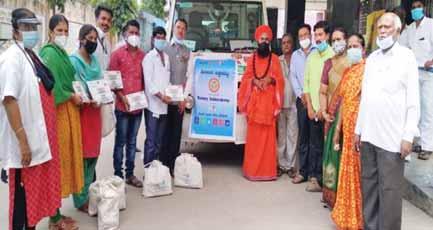
Rotary Sidderabetta, one of the sponsoring clubs, honours the ambulance special staff. RID 3190 felicitated 250 ambulance drivers and paramedics in appreciation of their service during the Covid crisis in Karnataka. The district’s Disease Prevention and Treatment team found out that 65 Covid ambulances were operating in the region and decided to hand over a ‘Warrior on Wheels’ citation along with a cheque for `1,000 each to all the drivers. Around 33 clubs raised `375,000 for the cause and each club recognised these Warrior on Wheels in their respective areas.
Homage to PDGs
Contributing to the development of Rotary as a potent force in enacting community service projects has been the vision and hard work of district governors. Our condolences to the families of PDGs who passed away this year.
V Nagaraj (1998–99) RI District 2981
Suresh Kasliwal (1984–85) RI District 3040
Dr Satpal Singla (1992–93) RI District 3090 Annamalai Muthuraman (1992–93) RI District 3000
Sharad Phatak (1999–2000) RI District 3040
U Surya Prakash Bhat (2003–04) RI District 3181
G Jaya Rao (1983–84) RI District 3020
Naresh Chand Jain (2003–04) RI District 3040
M Ramaswamy Iyer (1988–89) RI District 3211
In the next two years, Rotary clubs across India have been told to do at least five per cent of their global grant projects outside India and “a major chunk of it will come to Africa,” said RIPE Shekhar Mehta. Speaking at a webinar on Rotary Family Health Days (RFHD) hosted by the Rotarians for Family Health and AIDS Prevention (RFHA), South Africa, in partnership with the South African government, he said after he takes charge as RI president next year, “at least 10 per cent of GG projects will be done outside the country.”
Rotary is ready to play a bigger role in South Africa along with its government, NGOs and corporates, Mehta said and underlined the excellent partnership RFHA has forged with the health department over the years. “Unfortunately, this year, we will not be able to hold RFHD events as we are struggling with the greatest health issue that has afflicted mankind. Covid has brought the world down to its knees and we really don’t know how long this will continue. While many of our health programmes are
RIPE Mehta urges Indian Rotarians to do more projects in Africa
V Muthukumaran
disrupted, it is time for us to rethink our strategies and sharpen our axes,” he said.
RFHD is a signature programme of the RFHA being carried out in nine countries in Africa during October each year in which three-day free health camps are held to screen people for a host of preventable diseases, HIV/ AIDS and vaccinate children against viruses and infections. Since 2011, over 2.5 million people have benefitted from around 11 million free health camps offered through a public-private partnership model by RFHA.
Complimenting RFHA founder Marion Bunch and its present CEO Sue Paget for taking the programme from strength to strength, he said Rotary is not only committed to end polio, it will also deal with Covid, tackle HIV/AIDS and other health issues.
A corporate legacy
Polio eradication has been the corporate programme of Rotary over the last 35 years. From 350,000 cases a year in 125 countries then, to 150 children afflicted with polio in two countries so far this year, “Rotary has saved more than five million children either from death or being crippled.” Africa being declared polio-free with Nigeria getting
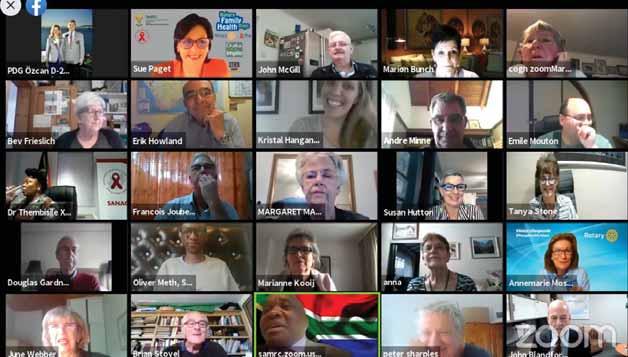
certified by the WHO this September is a major milestone. Polio is only the second vaccine preventable disease to be almost eradicated from the world, and Rotary can take justifiable pride in this work, said Mehta.
The Indian government takes Rotary seriously given its polio legacy and many successful projects being done in literacy, water and sanitation across the districts. “Around 100 million children are learning through the e-curriculum designed by Rotary and beamed on 12 TV channels during the lockdown. And this will scale up to 250 million children after normalcy,” he pointed out. This mission would not have been possible, but for the partnership with GoI. In literacy, Rotary India’s target is to make India over 95 per cent literate compared to the current 76 per cent.
Mission Africa
Mehta called upon Rotary clubs in Africa to increase their membership Sanitiser tunnels installed at Pune police stations
Team Rotary News
RC Pune Ganeshkhind, RID 3131, donated two sanitising tunnels to the Chakan and Mhalunge police stations in the city.
The sanitising facilities offer a full body spraying with a skin-friendly liquid for the staff and visitors. Located in the vicinity of an industrial belt, the Chakan police station is frequented by hundreds of visitors daily and has as “there is a great potential for growth in this region. We are an excellent organisation with tremendous reach, network, outstanding legacy, and passionate Rotarians with unmatched focus as shown in their commitment to end polio over the last 35 years.” RFHA is doing meaningful work in Africa which can be replicated in others parts of the world including South Asia, he said.
RFHD was conducted in India for two years; it can be revived now and taken to Nepal, Pakistan, Bangladesh and Sri Lanka in a gradual manner. RI has sanctioned $20 million as global grants for Covid projects around the world, besides one time disaster response fund ($25,000), he said, and noted Indian Rotarians have done projects worth $30 million for setting up Covid centres, donating equipment, PPE kits, masks and sanitisers at the grassroots level. “There is no disease we cannot overcome a 70-member police team. Each tunnel cost `150,000. The tunnels manufactured by Kotkar Energy Dynamics, a local company in Chakan, consist of a metallic fabricated body covered with polyvinyl screens and spray fountains inside the chamber. The entry and exit into the tunnel are easy and quick as the screen folders are plastic. “This is a very and no problem that we cannot take head on,” he added.
Addressing the RFHD webinar, South African Health Minister Dr Zwelini Mkhize said this health initiative by Rotary “achieves the goals of primary healthcare through an enabling environment for communities to proactively seek health care and be afforded the opportunity to practise preventative healthcare.”
The timeliness of this year’s programme could not be more critical, he noted, as “we emerge out of the Covid surge and refocus our energy on universal health coverage.” Health experts and Rotarians, including Centers for Disease Control and Prevention country director Dr John Blanford, Global Rotary CEO Dr Ian Burton, Action Group for Family Health and AIDS Prevention CEO Sue Paget and government officials, including Deputy Health Minister Dr Joe Phaahla, spoke
As part of its Covid-relief efforts,
RC Pune Ganeshkind president Rajesh Joshi felicitating a police officer.
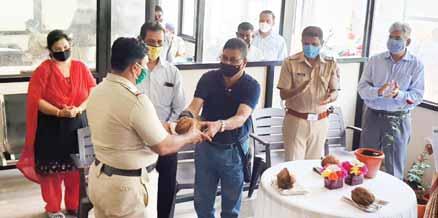
at the webinar. useful and thoughtful donation made by Rotary,” said a senior police officer.
The club felicitated the police officers at the stations for their service during the pandemic. Club president Rajesh Joshi and his wife Gauri were present along with Kotkar Energy managing director Atul Kotkar and his wife Archana, a club member.







